1, Loading steps
1. Import project - > import existing CCS eclipse project
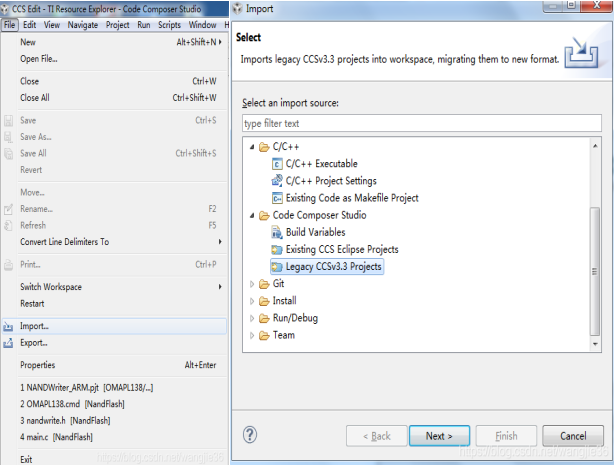
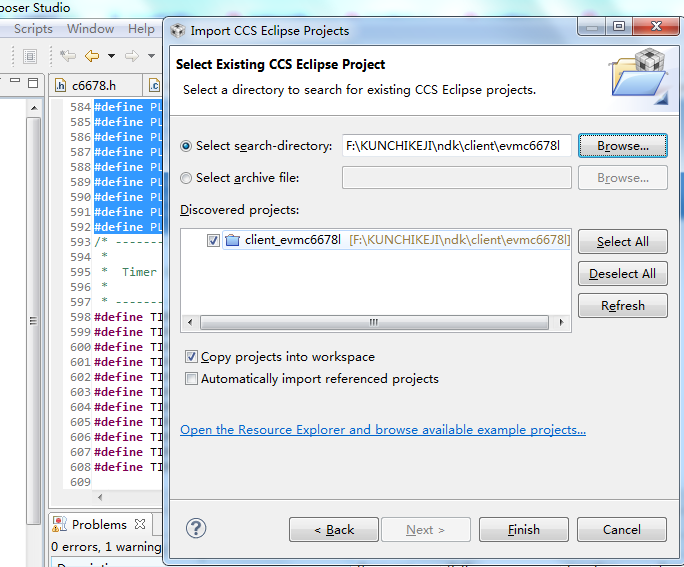
On the project, right-click properties, 2. Then double-click at the arrow and go through the location of four c files such as file to modify the path. Right click the project and select Rebuild Project, and the compilation is passed.
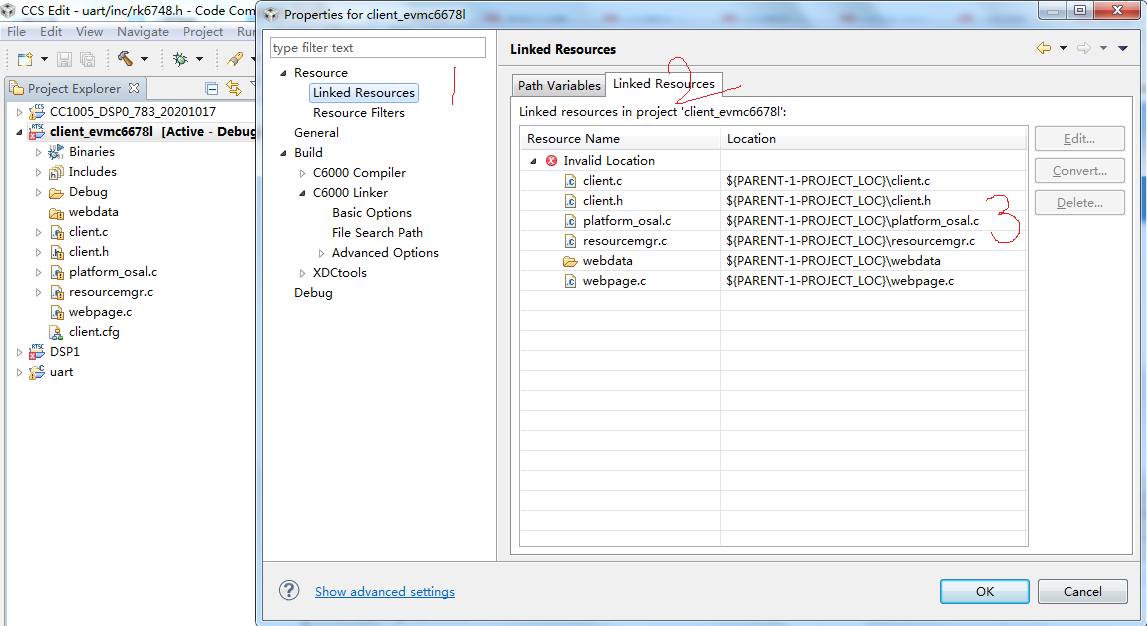
3. Right click the project and select new Target Configuration File, named evmc6678l ccxml. Select the emulator model and chip, and configure the gel file
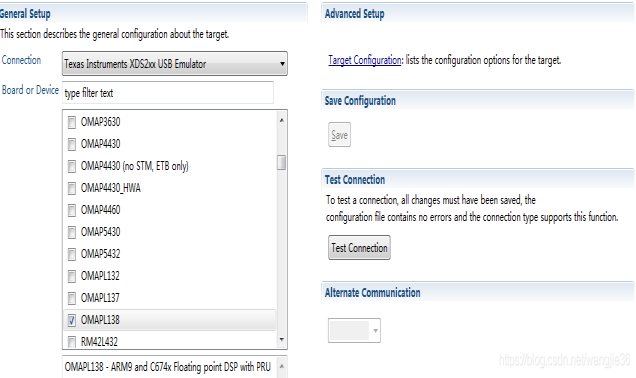
4, [the execution time of the gel file is generally after the DSP connect target and before the download code. Because the gel file usually sets some initialization registers, such as memory map, PLL and DDR initialization, these must be initialized before downloading. The scripts of the gel file can be found. The CCS5 version can find most EVM gels in this directory Script ccsv5ccs_ The baseemulationboards gel script is similar to C language functions, that is, to run some functions. For example, DDR initialization function. If DDR is not initialized, the code cannot be downloaded to DDR. There are two kinds of executing gel scripts: one is executed by the user, and the other is that CCS5 automatically associates the gel script with relevant operations. For example, connect target automatically associates the gel function of initializing PLL and DDR. You can find a gel script to see, which is more helpful for understanding.]
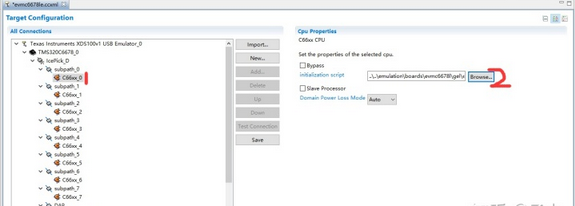
2, Debugging process
1. On the client Where DSP IP address is set in C:
//--------------------------------------------------------------------------- // Configuration char *HostName = "tidsp"; char *LocalIPAddr = "192.168.2.100"; char *LocalIPMask = "255.255.255.0"; // Not used when using DHCP char *GatewayIP = "192.168.2.101"; // Not used when using DHCP char *DomainName = "demo.net"; // Not used when using DHCP char *DNSServer = "0.0.0.0"; // Used when set to anything but zero
2. Connect the cable after rebuilding the project. The board needs power cord, emulator and network cable. Click Target configurations in the view. Right click the ccxml file in the pop-up interface and launch selected configuration.
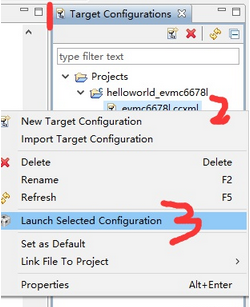
Print information after connection:
C66xx_0: GEL Output: Setup_Memory_Map... C66xx_0: GEL Output: Setup_Memory_Map... Done. C66xx_0: GEL Output: Connecting Target... C66xx_0: GEL Output: DSP core #0 C66xx_0: GEL Output: C6678L GEL file Ver is 2.005 C66xx_0: GEL Output: Global Default Setup... C66xx_0: GEL Output: Setup Cache... C66xx_0: GEL Output: L1P = 32K C66xx_0: GEL Output: L1D = 32K C66xx_0: GEL Output: L2 = ALL SRAM C66xx_0: GEL Output: Setup Cache... Done. C66xx_0: GEL Output: Main PLL (PLL1) Setup ... C66xx_0: GEL Output: PLL in Bypass ... C66xx_0: GEL Output: PLL1 Setup for DSP @ 1000.0 MHz. C66xx_0: GEL Output: SYSCLK2 = 333.3333 MHz, SYSCLK5 = 200.0 MHz. C66xx_0: GEL Output: SYSCLK8 = 15.625 MHz. C66xx_0: GEL Output: PLL1 Setup... Done. C66xx_0: GEL Output: Power on all PSC modules and DSP domains... C66xx_0: GEL Output: Security Accelerator disabled! C66xx_0: GEL Output: Power on all PSC modules and DSP domains... Done. C66xx_0: GEL Output: PA PLL (PLL3) Setup ... C66xx_0: GEL Output: PA PLL Setup... Done. C66xx_0: GEL Output: DDR3 PLL (PLL2) Setup ... C66xx_0: GEL Output: DDR3 PLL Setup... Done. C66xx_0: GEL Output: DDR begin (1333 auto) C66xx_0: GEL Output: XMC Setup ... Done C66xx_0: GEL Output: DDR3 initialization is complete. C66xx_0: GEL Output: DDR done C66xx_0: GEL Output: DDR3 memory test... Started C66xx_0: GEL Output: DDR3 memory test... Passed C66xx_0: GEL Output: PLL and DDR Initialization completed(0) ... C66xx_0: GEL Output: configSGMIISerdes Setup... Begin C66xx_0: GEL Output: SGMII SERDES has been configured. C66xx_0: GEL Output: Enabling EDC ... C66xx_0: GEL Output: L1P error detection logic is enabled. C66xx_0: GEL Output: L2 error detection/correction logic is enabled. C66xx_0: GEL Output: MSMC error detection/correction logic is enabled. C66xx_0: GEL Output: Enabling EDC ...Done C66xx_0: GEL Output: Configuring CPSW ... C66xx_0: GEL Output: Configuring CPSW ...Done C66xx_0: GEL Output: Global Default Setup... Done.
3,load .out file, print information after loading successfully:
C66xx_0: GEL Output: Invalidate All Cache...
C66xx_0: GEL Output: Invalidate All Cache... Done.
C66xx_0: GEL Output: GEL Reset...
C66xx_0: GEL Output: GEL Reset... Done.
C66xx_0: GEL Output: Disable all EDMA3 interrupts and events.
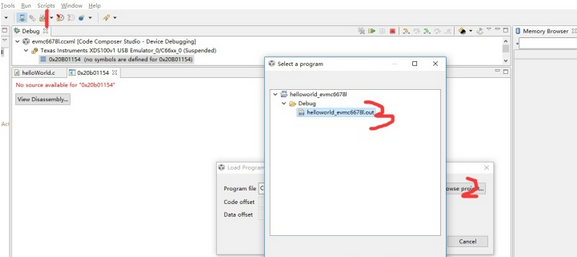
3, Code part analysis
1,client.c
/*
* ======== client.c ========
#include <stdio.h>
#include <ti/ndk/inc/netmain.h>
#include <ti/ndk/inc/_stack.h>
#include <ti/ndk/inc/tools/console.h>
#include <ti/ndk/inc/tools/servers.h>
#include "client.h"
/* BIOS6 include */
#include <ti/sysbios/BIOS.h>
/* Platform utilities include */
#include "ti/platform/platform.h"
/* Resource manager for QMSS, PA, CPPI */
#include "ti/platform/resource_mgr.h"
// When USE_OLD_SERVERS set to zero, server daemon is used
#define USE_OLD_SERVERS 0
//---------------------------------------------------------------------------
// Title String
char *VerStr = "\nTCP/IP Stack Example Client\n";
// Our NETCTRL callback functions
static void NetworkOpen();
static void NetworkClose();
static void NetworkIPAddr( IPN IPAddr, uint IfIdx, uint fAdd );
// Fun reporting function
static void ServiceReport( uint Item, uint Status, uint Report, HANDLE hCfgEntry );
/* Platform Information - we will read it form the Platform Library */
platform_info gPlatformInfo;
//---------------------------------------------------------------------------
// Configuration
char *HostName = "tidsp";
char *LocalIPAddr = "192.168.2.100";
char *LocalIPMask = "255.255.255.0"; // Not used when using DHCP
char *GatewayIP = "192.168.2.101"; // Not used when using DHCP
char *DomainName = "demo.net"; // Not used when using DHCP
char *DNSServer = "0.0.0.0"; // Used when set to anything but zero
// Simulator EMAC Switch does not handle ALE_LEARN mode, so please configure the
// MAC address of the PC where you want to launch the webpages and initiate PING to NDK */
Uint8 clientMACAddress [6] = {0x5C, 0x26, 0x0A, 0x69, 0x44, 0x0B}; /* MAC address for my PC */
UINT8 DHCP_OPTIONS[] = { DHCPOPT_SERVER_IDENTIFIER, DHCPOPT_ROUTER };
#undef TEST_RAW_NC
#undef TEST_RAW_SEND
#undef TEST_RAW_RECV
#define PACKET_SIZE 1000
#define PACKET_COUNT 1
#ifdef TEST_RAW_SEND
static HANDLE hSendRaw = 0;
static void SendRawEth();
#endif
#ifdef TEST_RAW_RECV
static HANDLE hRecvRaw = 0;
static void RecvRawEth();
#endif
/*************************************************************************
* @b EVM_init()
*
* @n
*
* Initializes the platform hardware. This routine is configured to start in
* the evm.cfg configuration file. It is the first routine that BIOS
* calls and is executed before Main is called. If you are debugging within
* CCS the default option in your target configuration file may be to execute
* all code up until Main as the image loads. To debug this you should disable
* that option.
*
* @param[in] None
*
* @retval
* None
************************************************************************/
void EVM_init()
{
platform_init_flags sFlags;
platform_init_config sConfig;
/* Status of the call to initialize the platform */
int32_t pform_status;
/*
* You can choose what to initialize on the platform by setting the following
* flags. Things like the DDR, PLL, etc should have been set by the boot loader.
*/
memset( (void *) &sFlags, 0, sizeof(platform_init_flags));
memset( (void *) &sConfig, 0, sizeof(platform_init_config));
sFlags.pll = 0; /* PLLs for clocking */
sFlags.ddr = 0; /* External memory */
sFlags.tcsl = 1; /* Time stamp counter */
#ifdef _SCBP6618X_
sFlags.phy = 0; /* Ethernet */
#else
sFlags.phy = 1; /* Ethernet */
#endif
sFlags.ecc = 0; /* Memory ECC */
sConfig.pllm = 0; /* Use libraries default clock divisor */
pform_status = platform_init(&sFlags, &sConfig);
/* If we initialized the platform okay */
if (pform_status != Platform_EOK) {
/* Initialization of the platform failed... die */
while (1) {
(void) platform_led(1, PLATFORM_LED_ON, PLATFORM_USER_LED_CLASS);
(void) platform_delay(50000);
(void) platform_led(1, PLATFORM_LED_OFF, PLATFORM_USER_LED_CLASS);
(void) platform_delay(50000);
}
}
}
//---------------------------------------------------------------------
// Main Entry Point
//---------------------------------------------------------------------
int main()
{
/* Start the BIOS 6 Scheduler */
BIOS_start ();
}
//
// Main Thread
//
//
int StackTest()
{
int rc;
int i;
HANDLE hCfg;
CI_SERVICE_TELNET telnet;
CI_SERVICE_HTTP http;
QMSS_CFG_T qmss_cfg;
CPPI_CFG_T cppi_cfg;
/* Get information about the platform so we can use it in various places */
memset( (void *) &gPlatformInfo, 0, sizeof(platform_info));
(void) platform_get_info(&gPlatformInfo);
(void) platform_uart_init();
(void) platform_uart_set_baudrate(115200);
(void) platform_write_configure(PLATFORM_WRITE_ALL);
/* Clear the state of the User LEDs to OFF */
for (i=0; i < gPlatformInfo.led[PLATFORM_USER_LED_CLASS].count; i++) {
(void) platform_led(i, PLATFORM_LED_OFF, PLATFORM_USER_LED_CLASS);
}
/* Initialize the components required to run this application:
* (1) QMSS
* (2) CPPI
* (3) Packet Accelerator
*/
/* Initialize QMSS */
if (platform_get_coreid() == 0)
{
qmss_cfg.master_core = 1;
}
else
{
qmss_cfg.master_core = 0;
}
qmss_cfg.max_num_desc = MAX_NUM_DESC;
qmss_cfg.desc_size = MAX_DESC_SIZE;
qmss_cfg.mem_region = Qmss_MemRegion_MEMORY_REGION0;
if (res_mgr_init_qmss (&qmss_cfg) != 0)
{
platform_write ("Failed to initialize the QMSS subsystem \n");
goto main_exit;
}
else
{
platform_write ("QMSS successfully initialized \n");
}
/* Initialize CPPI */
if (platform_get_coreid() == 0)
{
cppi_cfg.master_core = 1;
}
else
{
cppi_cfg.master_core = 0;
}
cppi_cfg.dma_num = Cppi_CpDma_PASS_CPDMA;
cppi_cfg.num_tx_queues = NUM_PA_TX_QUEUES;
cppi_cfg.num_rx_channels = NUM_PA_RX_CHANNELS;
if (res_mgr_init_cppi (&cppi_cfg) != 0)
{
platform_write ("Failed to initialize CPPI subsystem \n");
goto main_exit;
}
else
{
platform_write ("CPPI successfully initialized \n");
}
if (res_mgr_init_pass()!= 0) {
platform_write ("Failed to initialize the Packet Accelerator \n");
goto main_exit;
}
else
{
platform_write ("PA successfully initialized \n");
}
//
// THIS MUST BE THE ABSOLUTE FIRST THING DONE IN AN APPLICATION before
// using the stack!!
//
rc = NC_SystemOpen( NC_PRIORITY_LOW, NC_OPMODE_INTERRUPT );
if( rc )
{
platform_write("NC_SystemOpen Failed (%d)\n",rc);
for(;;);
}
// Print out our banner
platform_write(VerStr);
//
// Create and build the system configuration from scratch.
//
// Create a new configuration
hCfg = CfgNew();
if( !hCfg )
{
platform_write("Unable to create configuration\n");
goto main_exit;
}
// We better validate the length of the supplied names
if( strlen( DomainName ) >= CFG_DOMAIN_MAX ||
strlen( HostName ) >= CFG_HOSTNAME_MAX )
{
platform_write("Names too long\n");
goto main_exit;
}
// Add our global hostname to hCfg (to be claimed in all connected domains)
CfgAddEntry( hCfg, CFGTAG_SYSINFO, CFGITEM_DHCP_HOSTNAME, 0,
strlen(HostName), (UINT8 *)HostName, 0 );
// If the IP address is specified, manually configure IP and Gateway
#if defined(_SCBP6618X_) || defined(_EVMTCI6614_) || defined(DEVICE_K2H) || defined(DEVICE_K2K)
/* SCBP6618x, EVMTCI6614, EVMK2H, EVMK2K always uses DHCP */
if (0)
#else
if (!platform_get_switch_state(1))
#endif
{
CI_IPNET NA;
CI_ROUTE RT;
IPN IPTmp;
// Setup manual IP address
bzero( &NA, sizeof(NA) );
NA.IPAddr = inet_addr(LocalIPAddr);
NA.IPMask = inet_addr(LocalIPMask);
strcpy( NA.Domain, DomainName );
NA.NetType = 0;
// Add the address to interface 1
CfgAddEntry( hCfg, CFGTAG_IPNET, 1, 0,
sizeof(CI_IPNET), (UINT8 *)&NA, 0 );
// Add the default gateway. Since it is the default, the
// destination address and mask are both zero (we go ahead
// and show the assignment for clarity).
bzero( &RT, sizeof(RT) );
RT.IPDestAddr = 0;
RT.IPDestMask = 0;
RT.IPGateAddr = inet_addr(GatewayIP);
// Add the route
CfgAddEntry( hCfg, CFGTAG_ROUTE, 0, 0,
sizeof(CI_ROUTE), (UINT8 *)&RT, 0 );
// Manually add the DNS server when specified
IPTmp = inet_addr(DNSServer);
if( IPTmp )
CfgAddEntry( hCfg, CFGTAG_SYSINFO, CFGITEM_DHCP_DOMAINNAMESERVER,
0, sizeof(IPTmp), (UINT8 *)&IPTmp, 0 );
}
// Else we specify DHCP
else
{
CI_SERVICE_DHCPC dhcpc;
platform_write("Configuring DHCP client\n");
// Specify DHCP Service on IF-1
bzero( &dhcpc, sizeof(dhcpc) );
dhcpc.cisargs.Mode = CIS_FLG_IFIDXVALID;
dhcpc.cisargs.IfIdx = 1;
dhcpc.cisargs.pCbSrv = &ServiceReport;
dhcpc.param.pOptions = DHCP_OPTIONS;
dhcpc.param.len = 2;
CfgAddEntry( hCfg, CFGTAG_SERVICE, CFGITEM_SERVICE_DHCPCLIENT, 0,
sizeof(dhcpc), (UINT8 *)&dhcpc, 0 );
}
// Specify TELNET service for our Console example
bzero( &telnet, sizeof(telnet) );
telnet.cisargs.IPAddr = INADDR_ANY;
telnet.cisargs.pCbSrv = &ServiceReport;
telnet.param.MaxCon = 2;
telnet.param.Callback = &ConsoleOpen;
CfgAddEntry( hCfg, CFGTAG_SERVICE, CFGITEM_SERVICE_TELNET, 0,
sizeof(telnet), (UINT8 *)&telnet, 0 );
// Create RAM based WEB files for HTTP
AddWebFiles();
// HTTP Authentication
{
CI_ACCT CA;
// Name our authentication group for HTTP (Max size = 31)
// This is the authentication "realm" name returned by the HTTP
// server when authentication is required on group 1.
CfgAddEntry( hCfg, CFGTAG_SYSINFO, CFGITEM_SYSINFO_REALM1,
0, 30, (UINT8 *)"DSP_CLIENT_DEMO_AUTHENTICATE1", 0 );
// Create a sample user account who is a member of realm 1.
// The username and password are just "username" and "password"
strcpy( CA.Username, "username" );
strcpy( CA.Password, "password" );
CA.Flags = CFG_ACCTFLG_CH1; // Make a member of realm 1
rc = CfgAddEntry( hCfg, CFGTAG_ACCT, CFGITEM_ACCT_REALM,
0, sizeof(CI_ACCT), (UINT8 *)&CA, 0 );
}
// Specify HTTP service
bzero( &http, sizeof(http) );
http.cisargs.IPAddr = INADDR_ANY;
http.cisargs.pCbSrv = &ServiceReport;
CfgAddEntry( hCfg, CFGTAG_SERVICE, CFGITEM_SERVICE_HTTP, 0,
sizeof(http), (UINT8 *)&http, 0 );
//
// Configure IPStack/OS Options
//
// We don't want to see debug messages less than WARNINGS
rc = DBG_INFO;
CfgAddEntry( hCfg, CFGTAG_OS, CFGITEM_OS_DBGPRINTLEVEL,
CFG_ADDMODE_UNIQUE, sizeof(uint), (UINT8 *)&rc, 0 );
//
// This code sets up the TCP and UDP buffer sizes
// (Note 8192 is actually the default. This code is here to
// illustrate how the buffer and limit sizes are configured.)
//
// TCP Transmit buffer size
rc = 8192;
CfgAddEntry( hCfg, CFGTAG_IP, CFGITEM_IP_SOCKTCPTXBUF,
CFG_ADDMODE_UNIQUE, sizeof(uint), (UINT8 *)&rc, 0 );
// TCP Receive buffer size (copy mode)
rc = 8192;
CfgAddEntry( hCfg, CFGTAG_IP, CFGITEM_IP_SOCKTCPRXBUF,
CFG_ADDMODE_UNIQUE, sizeof(uint), (UINT8 *)&rc, 0 );
// TCP Receive limit (non-copy mode)
rc = 8192;
CfgAddEntry( hCfg, CFGTAG_IP, CFGITEM_IP_SOCKTCPRXLIMIT,
CFG_ADDMODE_UNIQUE, sizeof(uint), (UINT8 *)&rc, 0 );
// UDP Receive limit
rc = 8192;
CfgAddEntry( hCfg, CFGTAG_IP, CFGITEM_IP_SOCKUDPRXLIMIT,
CFG_ADDMODE_UNIQUE, sizeof(uint), (UINT8 *)&rc, 0 );
#if 0
// TCP Keep Idle (10 seconds)
rc = 100;
// This is the time a connection is idle before TCP will probe
CfgAddEntry( hCfg, CFGTAG_IP, CFGITEM_IP_TCPKEEPIDLE,
CFG_ADDMODE_UNIQUE, sizeof(uint), (UINT8 *)&rc, 0 );
// TCP Keep Interval (1 second)
// This is the time between TCP KEEP probes
rc = 10;
CfgAddEntry( hCfg, CFGTAG_IP, CFGITEM_IP_TCPKEEPINTVL,
CFG_ADDMODE_UNIQUE, sizeof(uint), (UINT8 *)&rc, 0 );
// TCP Max Keep Idle (5 seconds)
// This is the TCP KEEP will probe before dropping the connection
rc = 50;
CfgAddEntry( hCfg, CFGTAG_IP, CFGITEM_IP_TCPKEEPMAXIDLE,
CFG_ADDMODE_UNIQUE, sizeof(uint), (UINT8 *)&rc, 0 );
#endif
//
// Boot the system using this configuration
//
// We keep booting until the function returns 0. This allows
// us to have a "reboot" command.
//
do
{
rc = NC_NetStart( hCfg, NetworkOpen, NetworkClose, NetworkIPAddr );
} while( rc > 0 );
// Free the WEB files
RemoveWebFiles();
// Delete Configuration
CfgFree( hCfg );
// Close the OS
main_exit:
NC_SystemClose();
return(0);
}
//
// System Task Code [ Server Daemon Servers ]
//
static HANDLE hEcho=0,hEchoUdp=0,hData=0,hNull=0,hOob=0;
#ifdef _INCLUDE_IPv6_CODE
static HANDLE hEcho6=0, hEchoUdp6=0, hTelnet6=0, hOob6=0, hWeb6=0;
#endif
static void NetworkOpen()
{
// Create our local servers
hEcho = DaemonNew( SOCK_STREAMNC, 0, 7, dtask_tcp_echo,
OS_TASKPRINORM, OS_TASKSTKNORM, 0, 3 );
hEchoUdp = DaemonNew( SOCK_DGRAM, 0, 7, dtask_udp_echo,
OS_TASKPRINORM, OS_TASKSTKNORM, 0, 1 );
hData = DaemonNew( SOCK_STREAM, 0, 1000, dtask_tcp_datasrv,
OS_TASKPRINORM, OS_TASKSTKNORM, 0, 3 );
hNull = DaemonNew( SOCK_STREAMNC, 0, 1001, dtask_tcp_nullsrv,
OS_TASKPRINORM, OS_TASKSTKNORM, 0, 3 );
hOob = DaemonNew( SOCK_STREAMNC, 0, 999, dtask_tcp_oobsrv,
OS_TASKPRINORM, OS_TASKSTKNORM, 0, 3 );
// Create the IPv6 Local Servers.
#ifdef _INCLUDE_IPv6_CODE
hEcho6 = Daemon6New (SOCK_STREAM, IPV6_UNSPECIFIED_ADDRESS, 7, dtask_tcp_echo6,
OS_TASKPRINORM, OS_TASKSTKNORM, 0, 3 );
hEchoUdp6 = Daemon6New (SOCK_DGRAM, IPV6_UNSPECIFIED_ADDRESS, 7, dtask_udp_echo6,
OS_TASKPRINORM, OS_TASKSTKNORM, 0, 1 );
hTelnet6 = Daemon6New (SOCK_STREAM, IPV6_UNSPECIFIED_ADDRESS, 23,
(int(*)(SOCKET,UINT32))telnetClientProcess, OS_TASKPRINORM, OS_TASKSTKLOW,
(UINT32)ConsoleOpen, 2 );
hOob6 = Daemon6New (SOCK_STREAM, IPV6_UNSPECIFIED_ADDRESS, 999, dtask_tcp_oobsrv,
OS_TASKPRINORM, OS_TASKSTKNORM, 0, 3 );
hWeb6 = Daemon6New (SOCK_STREAM, IPV6_UNSPECIFIED_ADDRESS, HTTPPORT, httpClientProcess,
OS_TASKPRINORM, OS_TASKSTKHIGH, 0, 4);
#endif
}
static void NetworkClose()
{
DaemonFree( hOob );
DaemonFree( hNull );
DaemonFree( hData );
DaemonFree( hEchoUdp );
DaemonFree( hEcho );
#ifdef _INCLUDE_IPv6_CODE
Daemon6Free (hEcho6);
Daemon6Free (hEchoUdp6);
Daemon6Free (hTelnet6);
Daemon6Free (hOob6);
Daemon6Free (hWeb6);
#endif
#ifdef TEST_RAW_SEND
TaskDestroy (hSendRaw);
#endif
#ifdef TEST_RAW_RECV
TaskDestroy (hRecvRaw);
#endif
// Kill any active console
ConsoleClose();
}
//
// NetworkIPAddr
//
// This function is called whenever an IP address binding is
// added or removed from the system.
//
static void NetworkIPAddr( IPN IPAddr, uint IfIdx, uint fAdd )
{
static uint fAddGroups = 0;
IPN IPTmp;
if( fAdd )
platform_write("Network Added: ");
else
platform_write("Network Removed: ");
// Print a message
IPTmp = ntohl( IPAddr );
platform_write("If-%d:%d.%d.%d.%d\n", IfIdx,
(UINT8)(IPTmp>>24)&0xFF, (UINT8)(IPTmp>>16)&0xFF,
(UINT8)(IPTmp>>8)&0xFF, (UINT8)IPTmp&0xFF );
// This is a good time to join any multicast group we require
if( fAdd && !fAddGroups )
{
fAddGroups = 1;
// IGMPJoinHostGroup( inet_addr("224.1.2.3"), IfIdx );
}
/* Create a Task to send/receive Raw ethernet traffic */
#ifdef TEST_RAW_SEND
hSendRaw = TaskCreate( SendRawEth, "TxRawEthTsk", OS_TASKPRINORM, 0x1400, 0, 0, 0 );
#endif
#ifdef TEST_RAW_RECV
hRecvRaw = TaskCreate( RecvRawEth, "PerformRawRX", OS_TASKPRIHIGH, 0x1400, 0, 0, 0 );
#endif
}
//
// DHCP_reset()
//
// Code to reset DHCP client by removing it from the active config,
// and then reinstalling it.
//
// Called with:
// IfIdx set to the interface (1-n) that is using DHCP.
// fOwnTask set when called on a new task thread (via TaskCreate()).
//
void DHCP_reset( uint IfIdx, uint fOwnTask )
{
CI_SERVICE_DHCPC dhcpc;
HANDLE h;
int rc,tmp;
uint idx;
// If we were called from a newly created task thread, allow
// the entity that created us to complete
if( fOwnTask )
TaskSleep(500);
// Find DHCP on the supplied interface
for(idx=1; ; idx++)
{
// Find a DHCP entry
rc = CfgGetEntry( 0, CFGTAG_SERVICE, CFGITEM_SERVICE_DHCPCLIENT,
idx, &h );
if( rc != 1 )
goto RESET_EXIT;
// Get DHCP entry data
tmp = sizeof(dhcpc);
rc = CfgEntryGetData( h, &tmp, (UINT8 *)&dhcpc );
// If not the right entry, continue
if( (rc<=0) || dhcpc.cisargs.IfIdx != IfIdx )
{
CfgEntryDeRef(h);
h = 0;
continue;
}
// This is the entry we want!
// Remove the current DHCP service
CfgRemoveEntry( 0, h );
// Specify DHCP Service on specified IF
bzero( &dhcpc, sizeof(dhcpc) );
dhcpc.cisargs.Mode = CIS_FLG_IFIDXVALID;
dhcpc.cisargs.IfIdx = IfIdx;
dhcpc.cisargs.pCbSrv = &ServiceReport;
CfgAddEntry( 0, CFGTAG_SERVICE, CFGITEM_SERVICE_DHCPCLIENT, 0,
sizeof(dhcpc), (UINT8 *)&dhcpc, 0 );
break;
}
RESET_EXIT:
// If we are a function, return, otherwise, call TaskExit()
if( fOwnTask )
TaskExit();
}
void CheckDHCPOptions();
//
// Service Status Reports
//
// Here's a quick example of using service status updates
//
static char *TaskName[] = { "Telnet","HTTP","NAT","DHCPS","DHCPC","DNS" };
static char *ReportStr[] = { "","Running","Updated","Complete","Fault" };
static char *StatusStr[] = { "Disabled","Waiting","IPTerm","Failed","Enabled" };
static void ServiceReport( uint Item, uint Status, uint Report, HANDLE h )
{
platform_write( "Service Status: %-9s: %-9s: %-9s: %03d\n",
TaskName[Item-1], StatusStr[Status],
ReportStr[Report/256], Report&0xFF );
//
// Example of adding to the DHCP configuration space
//
// When using the DHCP client, the client has full control over access
// to the first 256 entries in the CFGTAG_SYSINFO space.
//
// Note that the DHCP client will erase all CFGTAG_SYSINFO tags except
// CFGITEM_DHCP_HOSTNAME. If the application needs to keep manual
// entries in the DHCP tag range, then the code to maintain them should
// be placed here.
//
// Here, we want to manually add a DNS server to the configuration, but
// we can only do it once DHCP has finished its programming.
//
if( Item == CFGITEM_SERVICE_DHCPCLIENT &&
Status == CIS_SRV_STATUS_ENABLED &&
(Report == (NETTOOLS_STAT_RUNNING|DHCPCODE_IPADD) ||
Report == (NETTOOLS_STAT_RUNNING|DHCPCODE_IPRENEW)) )
{
IPN IPTmp;
// Manually add the DNS server when specified
IPTmp = inet_addr(DNSServer);
if( IPTmp )
CfgAddEntry( 0, CFGTAG_SYSINFO, CFGITEM_DHCP_DOMAINNAMESERVER,
0, sizeof(IPTmp), (UINT8 *)&IPTmp, 0 );
#if 0
// We can now check on what the DHCP server supplied in
// response to our DHCP option tags.
CheckDHCPOptions();
#endif
}
// Reset DHCP client service on failure
if( Item==CFGITEM_SERVICE_DHCPCLIENT && (Report&~0xFF)==NETTOOLS_STAT_FAULT )
{
CI_SERVICE_DHCPC dhcpc;
int tmp;
// Get DHCP entry data (for index to pass to DHCP_reset).
tmp = sizeof(dhcpc);
CfgEntryGetData( h, &tmp, (UINT8 *)&dhcpc );
// Create the task to reset DHCP on its designated IF
// We must use TaskCreate instead of just calling the function as
// we are in a callback function.
TaskCreate( DHCP_reset, "DHCPreset", OS_TASKPRINORM, 0x1000,
dhcpc.cisargs.IfIdx, 1, 0 );
}
}
void CheckDHCPOptions()
{
char IPString[16];
IPN IPAddr;
int i, rc;
// Now scan for DHCPOPT_SERVER_IDENTIFIER via configuration
platform_write("\nDHCP Server ID:\n");
for(i=1;;i++)
{
// Try and get a DNS server
rc = CfgGetImmediate( 0, CFGTAG_SYSINFO, DHCPOPT_SERVER_IDENTIFIER,
i, 4, (UINT8 *)&IPAddr );
if( rc != 4 )
break;
// We got something
// Convert IP to a string:
NtIPN2Str( IPAddr, IPString );
platform_write("DHCP Server %d = '%s'\n", i, IPString);
}
if( i==1 )
platform_write("None\n\n");
else
platform_write("\n");
// Now scan for DHCPOPT_ROUTER via the configuration
platform_write("Router Information:\n");
for(i=1;;i++)
{
// Try and get a DNS server
rc = CfgGetImmediate( 0, CFGTAG_SYSINFO, DHCPOPT_ROUTER,
i, 4, (UINT8 *)&IPAddr );
if( rc != 4 )
break;
// We got something
// Convert IP to a string:
NtIPN2Str( IPAddr, IPString );
platform_write("Router %d = '%s'\n", i, IPString);
}
if( i==1 )
platform_write("None\n\n");
else
platform_write("\n");
}
#ifdef TEST_RAW_SEND
/* Routine to demonstrate sending raw ethernet packets using
* send() / sendnc() APIs and AF_RAWETH family socket.
*/
static void SendRawEth()
{
char* pBuffer = NULL;
ETHHDR* ptr_eth_header;
UINT32 rawether_type = 0x300, rawchannel_num = 0;
UINT8 src_mac[6], dst_mac[6], bData[20];
int i, j, val, bytes, retVal;
SOCKET sraw = INVALID_SOCKET;
#ifdef TEST_RAW_NC
PBM_Handle hPkt = NULL;
#endif
/* Allocate the file environment for this task */
fdOpenSession( TaskSelf() );
/* wait for the ethernet link to come up. */
TaskSleep(20000);
platform_write("Raw Eth Task Started ... \n");
/* Demonstrating use of SO_PRIORITY to configure
* custom properties for all packets travelling
* using this socket.
*
* Here, in this example we will use it for
* configuring a distinct EMAC channel number for each
* of the raw ethernet sockets.
*
* For example, Channel Assignment:
* Chan 0 - IP
* Chan 3 - Raw
*/
rawchannel_num = 3;
/* Create the raw ethernet socket */
sraw = socket(AF_RAWETH, SOCK_RAWETH, rawether_type);
if( sraw == INVALID_SOCKET )
{
platform_write("Fail socket, %d\n", fdError());
fdCloseSession (TaskSelf());
return;
}
/* Configure the transmit device */
val = 1;
retVal = setsockopt(sraw, SOL_SOCKET, SO_IFDEVICE, &val, sizeof(val));
if(retVal)
platform_write("error in setsockopt \n");
/* Configure the EMAC channel number */
val = rawchannel_num;
retVal = setsockopt(sraw, SOL_SOCKET, SO_PRIORITY, &val, sizeof(val));
if(retVal)
platform_write("error in setsockopt \n");
/* Send the RAW eth packets out */
for(j = 0; j < PACKET_COUNT; j++)
{
#ifndef TEST_RAW_NC
if ((pBuffer = mmAlloc (sizeof(char) * PACKET_SIZE)) == NULL)
{
platform_write("OOM ?? \n");
TaskExit();
}
#else
if(getsendncbuff(sraw, PACKET_SIZE, (void **) &pBuffer, &hPkt))
{
platform_write("Error: Raw Eth getsendncbuff failed Error:%d\n", fdError());
fdCloseSession( TaskSelf() );
fdClose(sraw);
TaskExit();
}
#endif
/* Configure the Source MAC, Destination MAC, Protocol and Payload */
for (i = 0; i < 6; i++)
{
src_mac[i] = 0x10 + i;
}
for (i = 0; i < 6; i++)
dst_mac[i] = 0x20 + i + 2;
for (i = 0; i < 20; i++)
bData[i] = 0x60 + i;
ptr_eth_header = (ETHHDR*)pBuffer;
/* Copy the source MAC address as is. */
mmCopy (ptr_eth_header->SrcMac, src_mac, 6);
/* Copy the destination MAC address as is. */
mmCopy (ptr_eth_header->DstMac, dst_mac, 6);
/* Configure the type in network order. */
ptr_eth_header->Type = HNC16(rawether_type);
/* Copy over the payload to the buffer */
mmCopy(pBuffer + ETHHDR_SIZE, bData, 20);
#ifndef TEST_RAW_NC
/* Send the packet using the copy version of send() API. */
bytes = send(sraw, (char *)pBuffer, PACKET_SIZE, 0);
#else
/* Use the no-copy version of send, sendnc() to send out the data */
bytes = sendnc(sraw, (char *)pBuffer, PACKET_SIZE, hPkt, 0);
#endif
#ifndef TEST_RAW_NC
/* If we allocated the buffer, free it up. If we used up the sendnc()
* API, the buffer will be freed up by the stack.
*/
mmFree(pBuffer);
#endif
if( bytes < 0 )
{
platform_write("Error: Raw Eth Send failed Error:%d\n", fdError());
#ifdef TEST_RAW_NC
sendncfree(hPkt);
#endif
fdCloseSession( TaskSelf() );
fdClose(sraw);
TaskExit();
}
}
platform_write("Raw Eth Task Ended ... \n");
fdClose(sraw);
/* Close the session & kill the task */
fdCloseSession( TaskSelf() );
TaskExit();
}
#endif
#ifdef TEST_RAW_RECV
/* Routine to demonstrate packet receive using recvnc() API
* and AF_RAWETH family sockets.
*/
static void RecvRawEth()
{
SOCKET sraw;
INT32 val,retVal, count = 0, bytes;
char* pBuf;
HANDLE hBuffer;
UINT32 rawchannel_num;
ETHHDR* ptr_eth_header;
platform_write ("Raw Eth Rx Task has been started\n");
/* Allocate the file environment for this task */
fdOpenSession( TaskSelf() );
/* Demonstrating use of SO_PRIORITY to configure
* custom properties for all packets travelling
* using this socket.
*
* Here, in this example we will use it for
* configuring a distinct EMAC channel number for each
* of the raw ethernet sockets.
*
* For example, Channel Assignment:
* Chan 0 - IP
* Chan 3 - Raw
*/
rawchannel_num = 3;
/* Create the main UDP listen socket */
sraw = socket(AF_RAWETH, SOCK_RAWETH, 0x300);
if( sraw == INVALID_SOCKET )
return;
/* Configure the transmit device */
val = 1;
retVal = setsockopt(sraw, SOL_SOCKET, SO_IFDEVICE, &val, sizeof(val));
if(retVal)
platform_write("error in setsockopt \n");
/* Configure the EMAC channel number as the priority tag for packets */
val = rawchannel_num;
retVal = setsockopt(sraw, SOL_SOCKET, SO_PRIORITY, &val, sizeof(val));
if(retVal)
platform_write("error in setsockopt \n");
/* Configure the Receive buffer size */
val = 1000;
retVal = setsockopt(sraw, SOL_SOCKET, SO_RCVBUF, &val, sizeof(val));
if(retVal)
platform_write("error in setsockopt \n");
while (count < PACKET_COUNT)
{
bytes = (int)recvnc( sraw, (void **)&pBuf, 0, &hBuffer );
if (bytes < 0)
{
/* Receive failed: Close the session & kill the task */
platform_write("Receive failed after packets Error:%d\n",fdError());
fdCloseSession( TaskSelf() );
TaskExit();
}
else
{
ptr_eth_header = (ETHHDR*)pBuf;
platform_write("Received RAW ETH packet, len: %d \n", PBM_getValidLen((PBM_Handle)hBuffer));
platform_write("Dst MAC Address = %02x-%02x-%02x-%02x-%02x-%02x Src MAC Address = %02x-%02x-%02x-%02x-%02x-%02x Eth Type = %d Data = %s \n",
ptr_eth_header->DstMac[0],ptr_eth_header->DstMac[1],ptr_eth_header->DstMac[2],
ptr_eth_header->DstMac[3],ptr_eth_header->DstMac[4],ptr_eth_header->DstMac[5],
ptr_eth_header->SrcMac[0],ptr_eth_header->SrcMac[1],ptr_eth_header->SrcMac[2],
ptr_eth_header->SrcMac[3],ptr_eth_header->SrcMac[4],ptr_eth_header->SrcMac[5],
ntohs(ptr_eth_header->Type), (pBuf + ETHHDR_SIZE));
}
count++;
/* Clean out the buffer */
recvncfree( hBuffer );
}
/* Close the session & kill the task */
fdCloseSession( TaskSelf() );
TaskExit();
return;
}
#endif
2. Execute BIOS in the main function_ Start() and create the process StackTest()
int main()
{
/* Start the BIOS 6 Scheduler */
BIOS_start ();
}3. Execute EVM first_ The init() function, which is executed before the main() function, is set in a * In cfg file
void EVM_init()
{
platform_init_flags sFlags;
platform_init_config sConfig;
/* Status of the call to initialize the platform */
int32_t pform_status;
/*
* You can choose what to initialize on the platform by setting the following
* flags. Things like the DDR, PLL, etc should have been set by the boot loader.
*/
memset( (void *) &sFlags, 0, sizeof(platform_init_flags));
memset( (void *) &sConfig, 0, sizeof(platform_init_config));
sFlags.pll = 0; /* PLLs for clocking */
sFlags.ddr = 0; /* External memory */
sFlags.tcsl = 1; /* Time stamp counter */
#ifdef _SCBP6618X_
sFlags.phy = 0; /* Ethernet */
#else
sFlags.phy = 1; /* Ethernet */
#endif
sFlags.ecc = 0; /* Memory ECC */
sConfig.pllm = 0; /* Use libraries default clock divisor */
pform_status = platform_init(&sFlags, &sConfig);
/* If we initialized the platform okay */
if (pform_status != Platform_EOK) {
/* Initialization of the platform failed... die */
while (1) {
(void) platform_led(1, PLATFORM_LED_ON, PLATFORM_USER_LED_CLASS);
(void) platform_delay(50000);
(void) platform_led(1, PLATFORM_LED_OFF, PLATFORM_USER_LED_CLASS);
(void) platform_delay(50000);
}
}
}4. After completing the corresponding configuration and starting the NetworkOpen service, dtask is associated_ udp_ Hello task, wait for UDP connection and perform relevant operations
static void NetworkOpen()
{
// Create our local servers
hEcho = DaemonNew( SOCK_STREAMNC, 0, 7, dtask_tcp_echo,
OS_TASKPRINORM, OS_TASKSTKNORM, 0, 3 );
hEchoUdp = DaemonNew( SOCK_DGRAM, 0, 7, dtask_udp_echo,
OS_TASKPRINORM, OS_TASKSTKNORM, 0, 1 );
hData = DaemonNew( SOCK_STREAM, 0, 1000, dtask_tcp_datasrv,
OS_TASKPRINORM, OS_TASKSTKNORM, 0, 3 );
hNull = DaemonNew( SOCK_STREAMNC, 0, 1001, dtask_tcp_nullsrv,
OS_TASKPRINORM, OS_TASKSTKNORM, 0, 3 );
hOob = DaemonNew( SOCK_STREAMNC, 0, 999, dtask_tcp_oobsrv,
OS_TASKPRINORM, OS_TASKSTKNORM, 0, 3 );
// Create the IPv6 Local Servers.
#ifdef _INCLUDE_IPv6_CODE
hEcho6 = Daemon6New (SOCK_STREAM, IPV6_UNSPECIFIED_ADDRESS, 7, dtask_tcp_echo6,
OS_TASKPRINORM, OS_TASKSTKNORM, 0, 3 );
hEchoUdp6 = Daemon6New (SOCK_DGRAM, IPV6_UNSPECIFIED_ADDRESS, 7, dtask_udp_echo6,
OS_TASKPRINORM, OS_TASKSTKNORM, 0, 1 );
hTelnet6 = Daemon6New (SOCK_STREAM, IPV6_UNSPECIFIED_ADDRESS, 23,
(int(*)(SOCKET,UINT32))telnetClientProcess, OS_TASKPRINORM, OS_TASKSTKLOW,
(UINT32)ConsoleOpen, 2 );
hOob6 = Daemon6New (SOCK_STREAM, IPV6_UNSPECIFIED_ADDRESS, 999, dtask_tcp_oobsrv,
OS_TASKPRINORM, OS_TASKSTKNORM, 0, 3 );
hWeb6 = Daemon6New (SOCK_STREAM, IPV6_UNSPECIFIED_ADDRESS, HTTPPORT, httpClientProcess,
OS_TASKPRINORM, OS_TASKSTKHIGH, 0, 4);
#endif
}